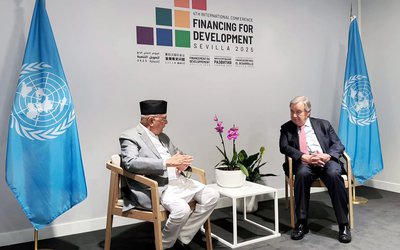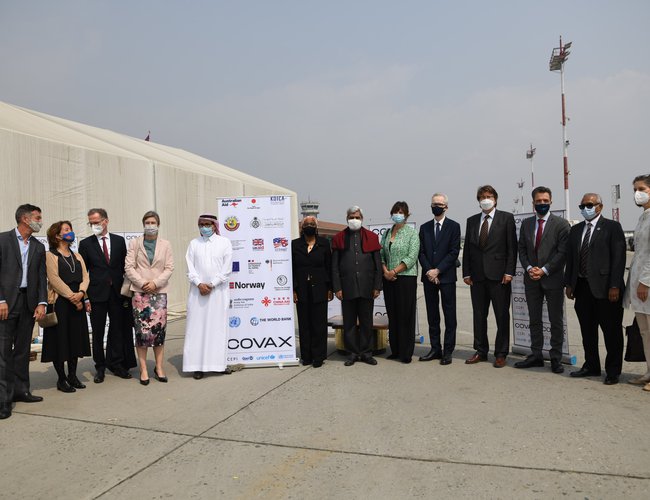
KATHMANDU, 7 March 2021 –Nepal received its first consignment of COVID-19 vaccine doses shipped through the COVAX Facility, a partnership between CEPI, Gavi, UNICEF and WHO, made possible through generous donor support from governments, international organizations, foundations and the private sector. The delivery of COVAX-procured vaccines to Nepal is part of a historic step towards ensuring equitable distribution of COVID-19 vaccines globally, in what will be the largest vaccine procurement and supply operation in history.
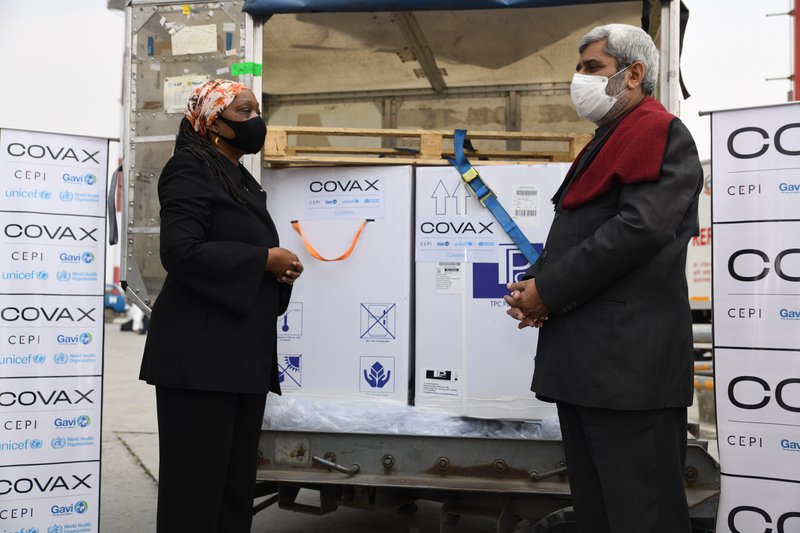
The goal of the COVAX Facility is to supply Nepal with enough doses to vaccinate 20% of the population depending on funding availability. Under the first COVAX allocation, the COVAX Facility will deliver 1.92 million vaccine doses to Nepal by the end of May 2021, in support of the Government of Nepal’s nation-wide vaccination campaign.
Today, the first COVAX shipment of 348,000 doses of AstraZeneca ‘Covishield’ vaccines manufactured by the Serum Institute of India (SII), together with 350,000 syringes and 3500 vaccine safety boxes arrived in Kathmandu before being distributed to provinces and municipalities across the country.
COVAX-supported vaccines provide a critical contribution to the Government of Nepal’s National Deployment and Vaccination Plan (NDVP)target to vaccinate roughly 22 million people, among them refugees, migrant returnees and other migrant populations. With the generous contribution of the Government of India, Nepal was able to commence the vaccination campaign and to date, 429,705 people have been vaccinated.
The COVAX Facility is generously funded by partner governments, including the Governments of Australia, Finland, France, Germany, Japan, Korea, Norway, Qatar, Saudi Arabia, Switzerland, the United Kingdom, the United States and the European Union as well as foundations and corporations
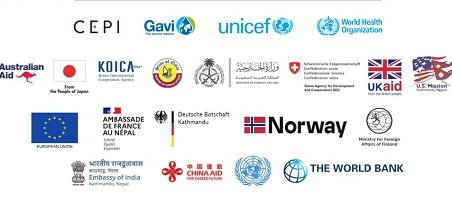
The arrival of the COVAX supplied vaccines will boost Nepal’s vaccination efforts as it coincides with the launch of the second phase of the vaccination campaign which targets those who are most vulnerable to developing severe illness from COVID-19 including the elderly and people with comorbidities. The second phase will also target teachers, as part of the expanded group of frontline workers.
Ongoing public health measures to prevent the transmission of COVID-19 will continue to be critical alongside vaccination. This includes adhering to testing and quarantine measures, mask-wearing, hand hygiene, and physical distancing of at least two meters.
Representatives of the COVAX technical and funding partners joined the Minister of Health and Population, Hridayesh Tripathi, in welcoming the global COVAX contribution to Nepal’s COVID-19 vaccination efforts at Tribhuvan International Airport in Kathmandu.
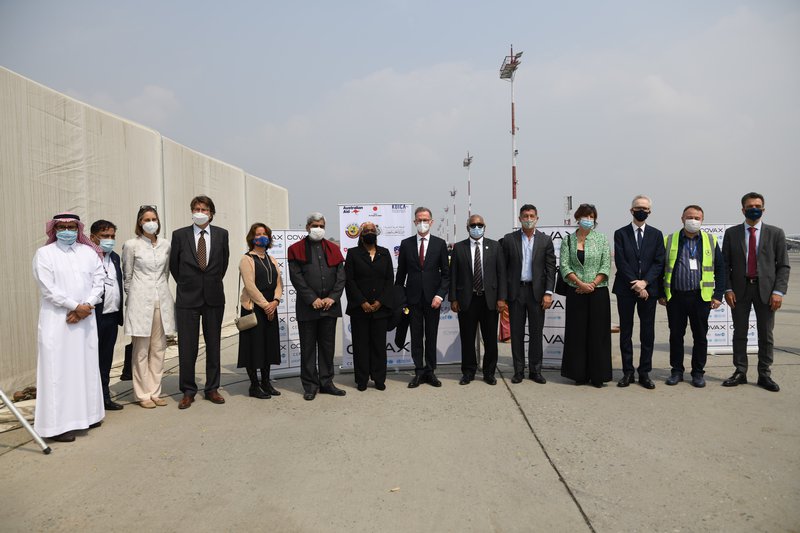
Development partners congratulated Nepal for being among the first countries in the world to have launched COVID-19 vaccination efforts in January 2021. They reiterated their solidarity with Nepal, as exemplified by the arrival of the first COVAX vaccine contribution.
Nepal’s development partners are committed to working with Nepal through the pandemic recovery period to ensure that no one is left behind. Supporting the vaccination of everyone living in Nepal through COVAX will go a long way to restoring normalcy, preventing the loss of social and economic gains made and paving the way for socio-economic recovery.
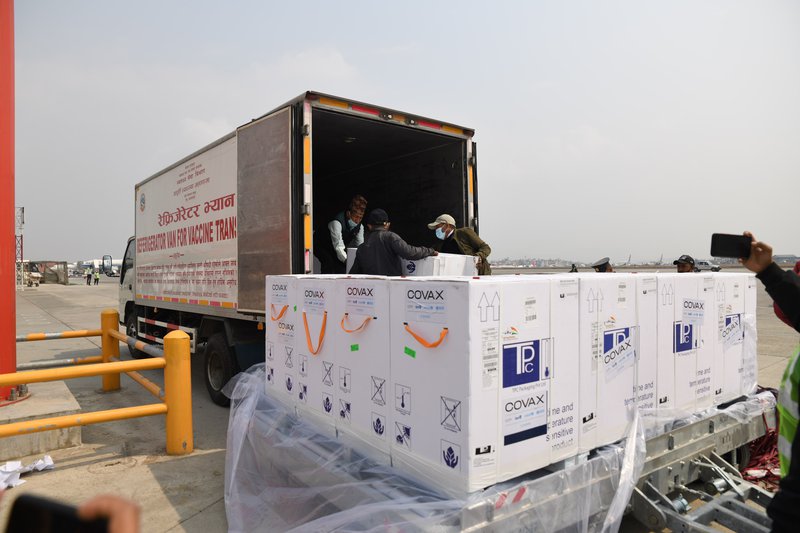
About COVAX
COVAX, the vaccines pillar of the Access to COVID-19 Tools (ACT) Accelerator, is co-led by the Coalition for Epidemic Preparedness Innovations (CEPI), Gavi, the Vaccine Alliance Gavi) and the World Health Organization (WHO) – working in partnership with developed and developing country vaccine manufacturers, UNICEF, the World Bank, and others. It is the only global initiative that is working with governments and manufacturers to ensure COVID-19 vaccines are available worldwide to both higher-income and lower-income countries.
CEPI is focused on the COVAX vaccine research and development portfolio: investing in R&D across a variety of promising candidates, with the goal to support the development of three safe and effective vaccines which can be made available to countries participating in the COVAX Facility. As part of this work, CEPI has secured the first right of refusal to potentially over one billion doses for the COVAX Facility to a number of candidates and made strategic investments in vaccine manufacturing, which includes reserving capacity to manufacture doses of COVAX vaccines at a network of facilities and securing glass vials to hold 2 billion doses of vaccine. CEPI is also investing in the next generation of vaccine candidates, which will give the world additional options to control COVID-19 in the future.
Gavi is focused on procurement and delivery for COVAX: coordinating the design, implementation and administration of the COVAX Facility and the Gavi COVAX AMC and working with its Alliance partners UNICEF and WHO, along with governments, on country readiness and delivery. The COVAX Facility is the global pooled procurement mechanism for COVID-19 vaccines through which COVAX will ensure fair and equitable access to vaccines for all 190 participating economies, using an allocation framework formulated by WHO.
- India’s External Affairs Ministry’s Senior Officials Says Indo-Nepal relations are ever expanding
- Jul 05, 2025
- Bhutan Government Unveils Three Pronged Strategies To Tackle Skilled Migration Crisis
- Jul 05, 2025
- Weather Forecast: Generally Cloudy Across The Country With Heavy Rain At One Or Two Places Bagmati And Koshi Provinces
- Jul 05, 2025
- FNCCI President Dhakal Urges British Companies to Invest in Nepal
- Jul 04, 2025
- Nepal Is Expected To See 60,000 People Infected with Dengue This Year
- Jul 04, 2025





